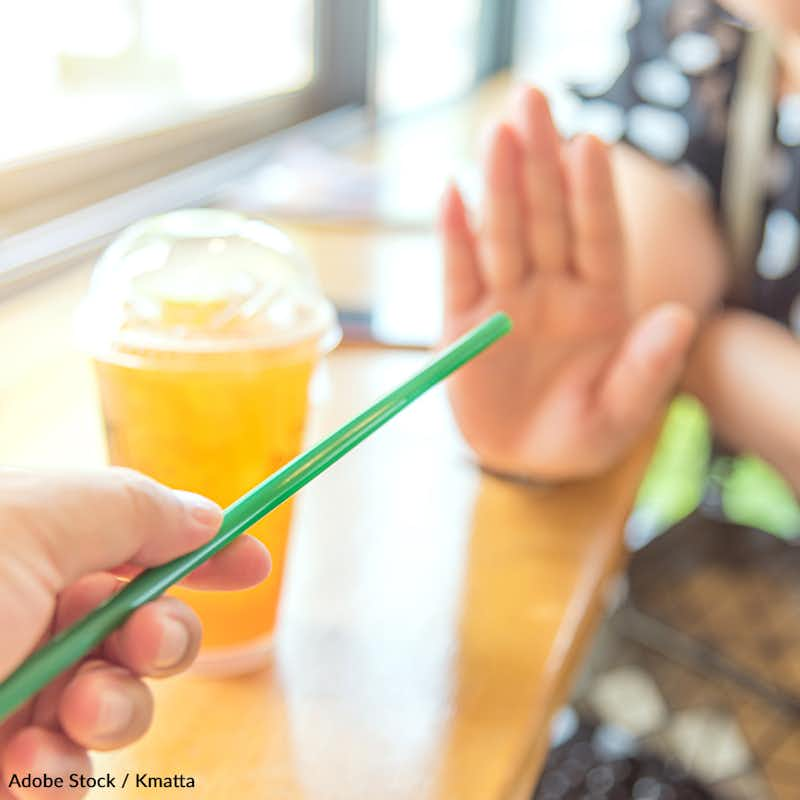Stop Plastic Straws from Sucking the Life Out of Our Oceans
7,764 signatures toward our 30,000 Goal
Sponsor: The Rainforest Site
There are simple steps we can all take to reduce plastic straw pollution and give our environment a chance to recover. Take action to protect our planet and its wildlife!

Plastic straws are a ubiquitous item in our daily lives, but the ease and convenience of using them comes at a high cost to our environment and wildlife. These items are a major contributor to plastic pollution, both on land and in the ocean, causing harm to wildlife, marine animals, and our ecosystem1.
One of the primary dangers of plastic straws is that they are non-biodegradable. This means that they will not break down in the environment, but instead will persist for hundreds of years2. Plastic straws are often mistaken for food by wildlife, such as sea turtles, which can ingest them and suffer injury or death. Additionally, plastic straws can entangle marine animals, causing suffocation and drowning3.
Plastic straws are a major source of ocean pollution, with billions of them ending up in our oceans every year. The plastic in the ocean is not only a hazard to marine animals but also to the delicate balance of the ocean's ecosystem4. Plastic pollution can harm phytoplankton, which are the base of the ocean food chain, and disrupt the transfer of nutrients and energy throughout the ocean5.
The widespread use of plastic straws has a significant impact on the biodiversity of our planet. Plastic pollution in the ocean can harm a wide range of marine animals, including seabirds, fish, sea turtles, whales, and dolphins. Plastic straws can also have a damaging effect on coastal ecosystems, such as coral reefs and mangroves, which provide habitat and food for many species of wildlife6.
To reduce the impact of plastic straws on our environment and wildlife, it is crucial for individuals, businesses, and governments to take action. One of the easiest ways to reduce the use of plastic straws is to switch to reusable alternatives, such as metal or paper straws. Another way to reduce the use of plastic straws is to simply say no to single-use plastic straws when ordering drinks at a restaurant or café7.
Take the plastic straw pledge and help us stamp out this pollution!
- Callie Nicholl, The Sandbox News (8 December 2019), "How much do plastic straws affect the environment?"
- Association of Zoos and Aquariums (15 November 2019), "How do straws hurt the environment?."
- Natasha Daily, National Geographic Society (2023), "For Animals, Plastic Is Turning the Ocean Into a Minefield."
- Laura Parker, National Geographic (23 February 2018), "Straw Wars: The Fight to Rid the Oceans of Discarded Plastic."
- National Geographic Society (2023), "Plastics in the Plankton, Plastics on Your Plate."
- Trent Gillies, CNBC (21 July 2018), "How straws go from your cup to becoming a ‘really big’ environmental problem."
- NationSwell (2023), "Straws That Don’t Suck: The Alternatives to Plastic Don’t Stop at Paper."
The Pledge:
I understand that plastic straws are a major source of ocean pollution, with billions of them ending up in our oceans every year.
As such, I pledge to help solve this problem through the following actions:
-
Say No to Plastic Straws I pledge to refuse to use plastic straws. I will ask for drinks to be served without a straw or bring my own reusable straw.
-
Use Reusable Straws I pledge to use reusable straws made from materials like stainless steel or glass, or use recycled paper straws, a great alternative to single-use plastic straws. They are durable, easy to clean, and can be used time and time again.
-
Choose Restaurants and Cafes that Don’t Use Plastic Straws I pledge to look for restaurants and cafes that have pledged to reduce their use of plastic straws or offer alternative options. I will support these businesses and encourage others to do the same.
-
Educate Others I pledge to share my knowledge and educate others about the dangers of plastic straws and the impact of plastic pollution on the environment and wildlife.
-
Support Legislation I pledge to support legislation aimed at reducing plastic pollution, including bans on single-use plastic straws.
-
Proper Disposal I pledge to make sure to properly dispose of any plastic straws I do use, so that they do not end up in the ocean or other waterways.
-
Participate in Clean-Up Efforts: I pledge to join local beach clean-up efforts and help remove plastic pollution from our oceans and waterways.
-
Vote with Your Wallet I pledge to support companies that have pledged to reduce their use of plastic and invest in sustainable alternatives.
-
Advocate for Change I will advocate for change at a local, national, and global level by speaking out against plastic pollution and the harm it causes to the environment and wildlife.
-
Be a Good Role Model I pledge to lead by example and inspire others to take action. I will make reducing plastic straw pollution a priority in my life and encourage others to do the same.
By making small changes in my daily life, I pledge to protect our planet and preserve its wildlife for future generations.
Pledged by,